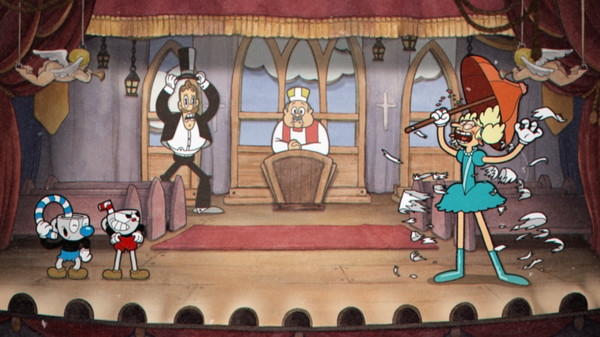Press Play to Start — Part 4: Influence and Homage

Video game music does not exist in a self-contained bubble; it is a part of the larger media of music. This connection can be seen when, sometimes, artists create music for video games as the band Korn did when they created the main theme for 2012's Silent Hill: Downpour. Another example is when David Bowie and fellow Tin Machine guitarist Reeves Gabrels worked on the soundtrack for the 1999 French video game Omikron: The Nomad Soul, which included some original songs by Bowie.
On the other side of this connection, video game music actively takes influence from other pieces of music. Whether by just using existing songs — such as FIFA 17 using Balkan Beat Box's I Trusted U, by covering existing songs — such as 2017's The End is Nigh covering Dvorak's New World Symphony in The Arid Flats, or by homaging songs — such as 2004's Metal Gear Solid 3: Snake Eater's main theme paying very direct homage to old James Bond themes like Goldfinger. In this article, we focus more on how video games cover and homage different songs by taking a look at the main theme of 2017's Resident Evil 7: Biohazard and the music to the recently released Cuphead.
Go Tell Aunt Rhody — The Modern Descendant to a Long List of Covers
Composed by Michael Levine, best known for Kit Kat's "Gimme a Break" advertisements, "Spider Pig" from The Simpsons Movie or Lorde's version of Everybody Wants to Rule the World. The song finds its roots in a strange place, Jean-Jacques Rousseau's 1752's opera Le Devin du Village, specifically a short melody from it heard at the beginning of the linked video. This short melody passed down throughout the decades and was used in many pieces of music; from the English Lord, Dismiss Us with Thy Blessing, through the original folk version of Go Tell Aunt Rhody and the Japanese kindergarten song Musunde Hiraite.
As an American born in Japan, Michael was familiar with both Musunde Hiraite and Go Tell Aunt Rhody. When the developers asked him to create a "song that was traditional, yet recognized internationally. And then turn it into something profoundly scary and creepy", he started thinking on which song to write, then the connection between the two songs came and he ran with it. As he put it:
"The peculiar alignment of Rhody and Musunde seemed like a message I could not ignore"
Peculiar does not even begin to describe what he turned the song into; a chaotic, dark and dissonant piece that is surprisingly incredibly catchy. The piece turned out this way because the developers continually told him to "go even further!" so much so that he describes it as an "art-house sound-design piece". Michael also changed the lyrics of the original song to fit the narrative of the game which takes place in a run-down plantation in Louisiana.
Cuphead — The First Fleischer Studios Style Cartoon in Decades
Cuphead is a recently released game that directly homages the style of the cartoons that were made in the 30s; it was very well well received and as one journalist described it: "[it has] what might be the most beautiful and playful presentation in games history". Cuphead does not just homage the cartoons, it goes the extra mile — including the fact that most of the game was hand-drawn, and, of course, its authentic music. The composer, Kristofer Maddigan, says that he did "very little composition before this project", which seems very surprising considering how great the soundtrack turned out. Describing the intentions behind his composition, he says that they "didn’t want to make it just sound old, but reminiscent of the specific time. It couldn’t sound modern, but it still had to be clean". He then describes the end result as:
"In some ways, it’s definitely anachronistic, but it still reflects the sound we were aiming for"
That sound is very reminiscent of genres such as Big Band, Ragtime, and Jazz. The soundtrack turned out to be a hit; debuting at number one on Bandcamp and number nine on Billboard's Jazz charts. There is even a vinyl version of the soundtrack available. The greatest thing about Cuphead is that, by the power of homage, it brings back a forgotten and beloved era of cartoons that otherwise, would have been left in the 30s.
You can read the first through third parts of this series here: Part 1; Part 2; Part 3







